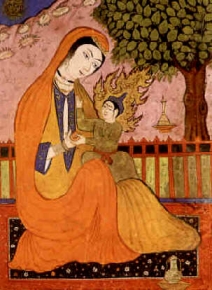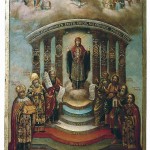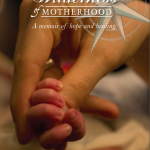I have some more thoughts on Liberating Liturgies for you today. I’m going to keep on talking about my (not the, but my) feminist Apostles’ Creed, and why I rewrote this creed the way I did. I’ve already talked about some imagery for God that I find extremely empowering: God Our Mother Bear and Sophia. Now I’m going to talk about something a little different: Mary, the mother of Jesus.
I believe in God, our Mother Bear,
source of all being.
I believe in Jesus Christ, God’s wisdom made flesh,
along with Sophia, the church, and all that live in wisdom.
Born of the bad-ass womanist liberation theologian, Mary,
suffered under the systems of oppression of this world,
was crucified, died, and was buried,
forever joining in solidarity with those murdered by Empire. On the third day, the women declared him risen; signifying God’s “No” to oppression. He points to God our Mother Bear, who works in this world, calling for justice for the poor and oppressed.I believe in Sophia Spirit, Christ’s body, the church, the communion of saints, the grace to reject this world’s systems, hope for justice in the future, and renewed life everlasting. Amen.

Being raised in a protestant, fundamental Baptist church, I have a weird relationship with Mary. Actually, I should say that I have practically no relationship with Mary. We were almost taught to be afraid of her growing up–to view her as a false god worshipped by those “evil Catholics.”
It took me a long time to really have appreciation for Mary. It started when I realized that, had Mary gone to my Baptist high school, she would have been expelled.
I believe that Jesus is present in those who society views as “the least of these.” But Mary is too. Mary is present in the pregnant teenagers that get kicked out of Christian schools, and mocked by their peers. She is present in the bodies of those who are called “sluts” or “whores” because of the choices they make or the rumors others start about them. Whether you believe Mary truly was a virgin or not, she made a choice to accept God’s call and become an unwed mother, and it’s quite possible that she faced stigma and shame for this decision.
For those of us recovering from the shame that Christian purity culture heaps on us, Mary can be an affirmation. While purity culture tells pregnant teenagers, unwed pregnant people, and those who choose to have sex (or even those who are assaulted or raped), that we are damaged goods, Mary chose to become an unwed mother and was called “blessed among women.”
After I left an abusive relationship in high school, my abuser (who raped me), started telling people we knew that he’d slept with me, even sharing intimate details about my body. I faced rumors and rejection from friends. I had youth pastors confront me because of things they’d heard. I even faced sexual harassment from young men in my youth group, who thought I was “easy,” and therefore would accept their advances. I lived for years with this shame, but now I am able to find affirmation in Mary.
Women of color, especially, are seen as inherently “impure” by many white purity culture Christians and by our white supremacist society (as TF Charlton points out in this great series). Whether they are virgins or not is irrelevant to white supremacy. But Mary, who was a woman of color, tells them that they are blessed.
I didn’t actually mention Mary’s virginity in my creed.
There’s a reason for that. I don’t think Mary’s virginity (or lack thereof?) is the most important thing about Mary.
In the protestant circles I grew up in, all we ever talked about when we talked about Mary was whether or not she was truly a virgin. Discussions of Mary were limited to defending the absolute necessity of the virgin birth.
I’m not sure whether I believe in a literal virgin birth, or if I believe that the idea of the virgin birth was a literary addition used to connect Jesus’s birth to traditions of Israel, which were filled with seemingly impossible births (Isaac, Samuel, Moses, etc.)–symbols of the power of God to create life in unexpected situations.
Literal or literary, the virgin birth is another chapter in the long story of God’s liberation.
But Mary was, and is, more than just her virginal status. These discussions that focus solely on Mary’s virginity remind me of a quote from Jessica Valenti’s book The Purity Myth:
For women especially, virginity has become the easy answer- the morality quick fix. You can be vapid…and unethical, but so long as you’ve never had sex, you’re a “good” (i.e. “moral) girl and therefore worthy of praise.
It seems as though Mary has gotten this treatment, perhaps especially in today’s evangelical churches. She is worthy of praise only insofar as she remained a literal virgin and “pure” until marriage (or to some, until death).
Yet, the gospel narratives tell us more about Mary than just her virginity.
In the book of Luke, Mary is a songwriter and poet. The song attributed to her rings with themes of power and liberation:
My soul exalts the Lord, And my spirit has rejoiced in God my Savior. “
For He has had regard for the humble state of His bondslave;
For behold, from this time on all generations will count me blessed.
“For the Mighty One has done great things for me;
And holy is His name.
“And His mercy is upon generation after generation
Toward those who fear Him.
“He has done mighty deeds with His arm;
He has scattered those who were proud in the thoughts of their heart.
“He has brought down rulers from their thrones,
And has exalted those who were humble.
“He has filled the hungry with good things;
And sent away the rich empty-handed.
“He has given help to Israel His servant,
In remembrance of His mercy,
As He spoke to our fathers,
To Abraham and his descendants forever.”
This is why I do not mention Mary’s virginity in my creed. Enough people are talking about that, and have been talking about that for centuries. Yet, at least in the protestant circles I’ve spent most of my life in (I know many Catholics who hold Mary in much higher regard), the other aspects of her life are ignored.
For me, Mary is a “bad-ass womanist liberation theologian.” I might never know her virginal status, and I don’t care. She was a woman who used her faith to fight for liberation, and she is a hero for that.
_____
If you are interested in submitting your own liturgies to this project, read this blog post, and email me at moonsn11@gmail.com.












